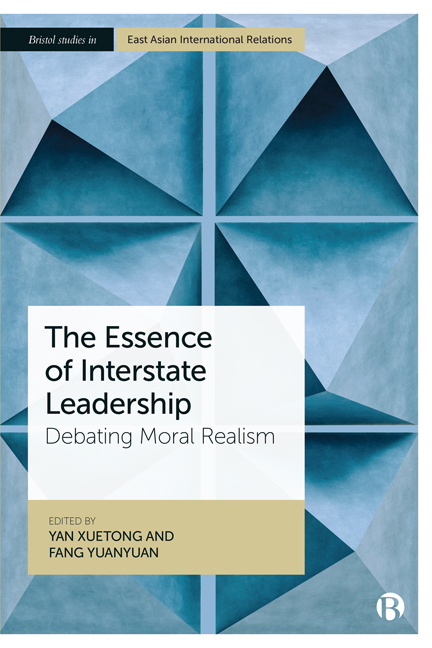Book contents
- Frontmatter
- Contents
- List of Abbreviations
- Notes on Contributors
- Preface
- 1 Interstate Leadership, Moral Realism, and their Critics
- 2 IR Moral Realism as a Universal Theory
- 3 Moral Realism as an Alternative Approach to the Agent-Structure Problem
- 4 Prospects, Promise, and Limitations of Moral Realism
- 5 Ideal Morality and Realist Interest of Moral Realism
- 6 The Conception of Morality in Moral Realism
- 7 Moral Realism and Hegemonic Transition
- 8 Innovation of Moral Realism and Dialogue with It
- 9 Moral Realism and Sino-American Relations
- 10 Moral Realism on Interstate Leadership in Response to Critics
- Appendix 1 Written Discussion between Rajesh Rajagopalan and Yan Xuetong
- Appendix 2 ‘Chinese School’ as an Inappropriate Title
- Selected Bibliography
- Index
1 - Interstate Leadership, Moral Realism, and their Critics
Published online by Cambridge University Press: 18 January 2024
- Frontmatter
- Contents
- List of Abbreviations
- Notes on Contributors
- Preface
- 1 Interstate Leadership, Moral Realism, and their Critics
- 2 IR Moral Realism as a Universal Theory
- 3 Moral Realism as an Alternative Approach to the Agent-Structure Problem
- 4 Prospects, Promise, and Limitations of Moral Realism
- 5 Ideal Morality and Realist Interest of Moral Realism
- 6 The Conception of Morality in Moral Realism
- 7 Moral Realism and Hegemonic Transition
- 8 Innovation of Moral Realism and Dialogue with It
- 9 Moral Realism and Sino-American Relations
- 10 Moral Realism on Interstate Leadership in Response to Critics
- Appendix 1 Written Discussion between Rajesh Rajagopalan and Yan Xuetong
- Appendix 2 ‘Chinese School’ as an Inappropriate Title
- Selected Bibliography
- Index
Summary
The intensive major power rivalry, the increasing uncertainty of international relations, the decline of democracy, the prevailing deglobalization, the devastating impacts of pandemics, and many other emerging global issues are becoming daunting. In the wake of these escalating challenges, there is a need for robust international leadership, which unfortunately is absent. Regarding the global spread of pandemics, Tedros Adhanom Ghebreyesus, Director- General of the World Health Organization (WHO), notes that the major threat we are facing now is not from the COVID- 19 pandemic, but from the lack of global leadership.1 The reality could be even worse than mere lack of a global leadership because the prevalence of populist leadership in major powers is driving the world towards a more conflicting, rather than cooperative, order.
The absence of a positive global leadership has its root in both power structure and individual causes. Structurally, there is a leadership dilemma accompanying the power transition process, with both the declining hegemon and the rising state. With a declining relative comprehensive capability, it is difficult for a hegemon to continue to bear the burden of providing necessary common goods for maintenance of the global order. However, reneging on such commitments will deteriorate its leadership and leave the opportunity for the rising power to replace it. For the rising state, the leadership dilemma exists as well, because if it lobbies for leadership in international affairs, it will provoke hostility and containment from the hegemon and its client states. Meanwhile, the rising power is unable to provide the same amount of public goods to the world as the hegemon because of its material power being less than the latter. Due to the leadership dilemma, a vacuum of interstate leadership is likely to occur during the power transition between major states.
Another factor often overlooked is the strategic preferences of leaders of major powers, which was vividly demonstrated in the case of the United States (US) during the administration of Donald Trump. When taking over the reins from the Barack Obama administration, it possessed the same power resources as its predecessor.
- Type
- Chapter
- Information
- The Essence of Interstate LeadershipDebating Moral Realism, pp. 1 - 15Publisher: Bristol University PressPrint publication year: 2023



